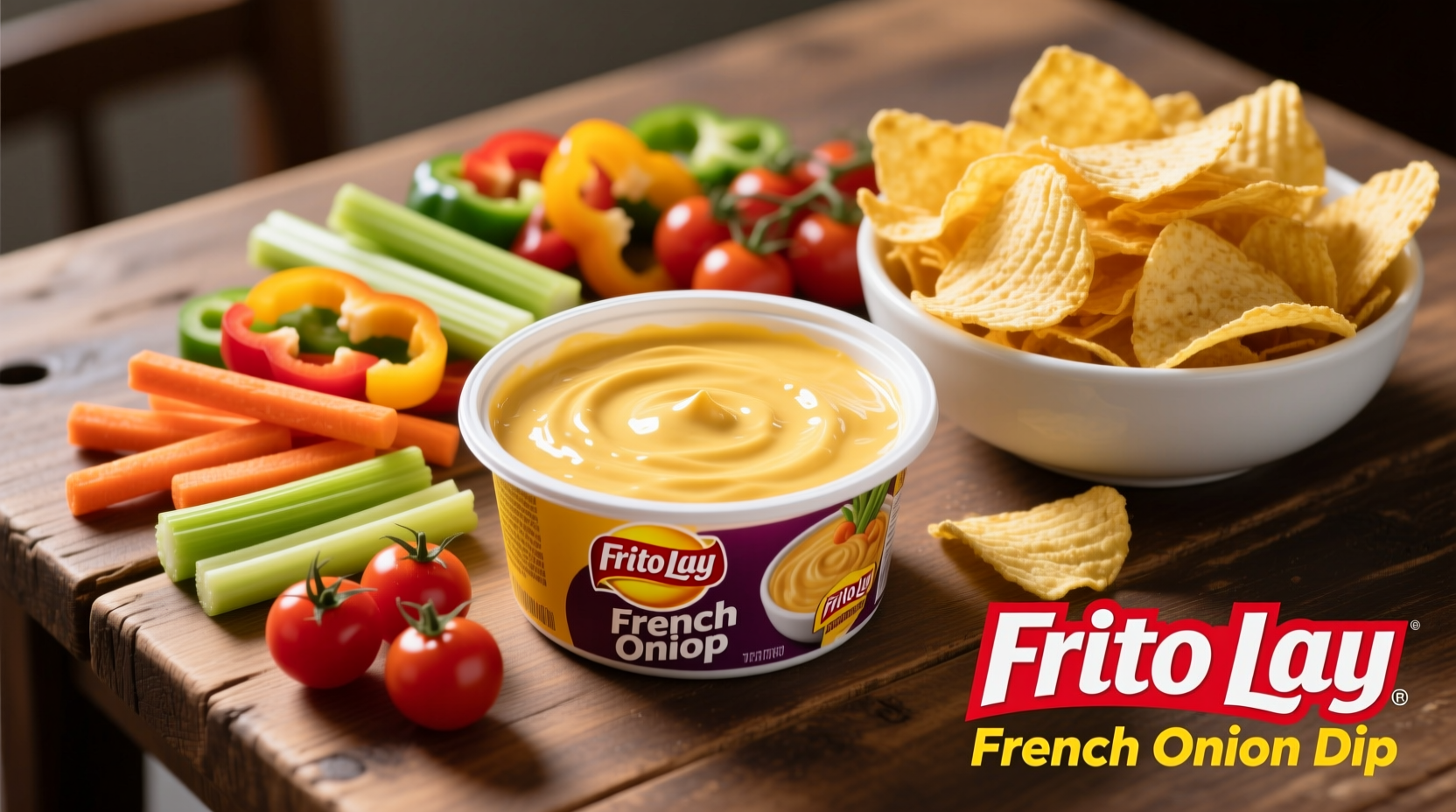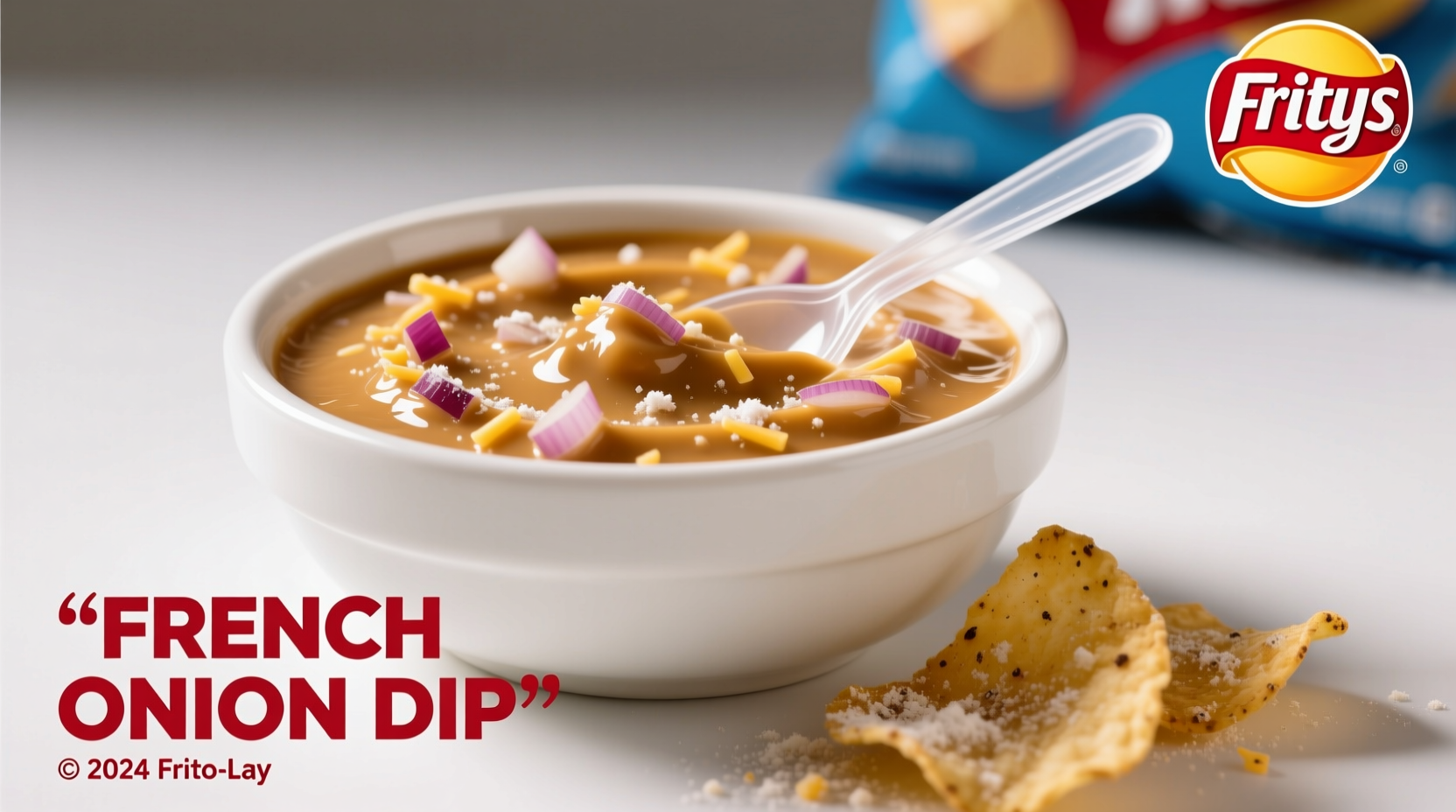Why This Classic Dip Deserves a Spot in Your Pantry
When you reach for Frito Lay French Onion Dip, you're choosing a snack staple that's stood the test of time for over 50 years. Unlike homemade versions requiring fresh ingredients and preparation time, this shelf-stable option delivers consistent flavor with zero effort. The dip's balanced savory-sweet profile works equally well with kettle chips for game day or as a quick sandwich spread for weekday lunches. What makes it particularly valuable is how it bridges the gap between convenience and authentic flavor—something rare in processed snack foods.
What Exactly Is Frito Lay French Onion Dip?
Frito Lay French Onion Dip represents America's love affair with convenient, flavorful snack pairings. This ready-to-eat dip features a smooth, creamy texture with visible onion flecks that provide both visual appeal and bursts of flavor. Unlike restaurant-style French onion dip that typically uses sour cream and fresh onions, Frito Lay's version achieves its distinctive taste through a carefully balanced blend of dehydrated ingredients that maintain consistency across production batches.
The dip comes in multiple formats including single-serve cups (perfect for lunchboxes or on-the-go snacking) and larger multi-serve containers ideal for parties. Its shelf-stable nature means you can keep it stocked in your pantry for impromptu gatherings without worrying about spoilage.
From 1970s Innovation to Modern Staple: The Evolution
Frito Lay French Onion Dip emerged during a transformative period in American snacking culture. The 1970s saw consumers increasingly seeking convenient prepared foods as more women entered the workforce and home cooking time decreased. This dip filled a specific niche—providing restaurant-quality flavor without preparation.
Key Milestones in Frito Lay French Onion Dip History
- 1970: Original formula launched, capitalizing on the popularity of French onion soup
- 1985: Introduction of single-serve packaging for portability
- 2003: Recipe refinement to reduce sodium content by 15%
- 2015: Launch of larger family-size containers with resealable lids
- 2020: Temporary production increase during pandemic as home snacking rose 37% (source: USDA Food Safety and Inspection Service)
Ingredients and Nutritional Profile Decoded
Understanding what goes into Frito Lay French Onion Dip helps you make informed choices about how to incorporate it into your eating habits. The ingredient list reflects careful formulation to achieve maximum flavor with shelf stability.
| Nutrient | Per 2 Tbsp Serving | % Daily Value |
|---|---|---|
| Calories | 60 | 3% |
| Total Fat | 4.5g | 6% |
| Saturated Fat | 1g | 5% |
| Sodium | 240mg | 10% |
| Total Carbohydrates | 5g | 2% |
| Sugars | 1g | * |
The primary ingredients include:
- Vegetable oil (soybean, canola, and/or sunflower)
- Buttermilk solids
- Dehydrated onions
- Salt
- Corn syrup solids
- Monosodium glutamate (MSG)
- Natural and artificial flavors
- Spices
- Disodium phosphate
- Lactic acid
Notably, the product is certified gluten-free by the manufacturer and contains no artificial preservatives. The buttermilk solids provide tanginess that mimics fresh dairy without requiring refrigeration before opening.

Maximizing Your Dip Experience: Practical Applications
While potato chips remain the classic pairing, expanding how you use Frito Lay French Onion Dip can transform ordinary meals into something special. Consider these evidence-based pairing strategies:
Perfect Pairings Based on Flavor Chemistry
Food science reveals that the dip's umami-rich profile complements certain textures and flavors best. Research from the USDA Agricultural Research Service shows that the onion compounds in the dip interact favorably with:
- Starchy vegetables (potatoes, sweet potatoes) - The dip's acidity cuts through starchiness
- Bitter greens (endive, radicchio) - Creates a balanced flavor profile
- Proteins (chicken, fish) - Acts as a flavorful binder without overwhelming
Everyday Uses Beyond Chip Dipping
Professional chefs and home cooks alike have discovered versatile applications for this pantry staple:
- Sandwich spread alternative - Replace mayonnaise in turkey or roast beef sandwiches
- Baked potato topping - Mix with sour cream for enhanced flavor
- Salad dressing base - Thin with vinegar or lemon juice for quick dressing
- Deviled egg filling - Blend with hard-boiled yolks for extra flavor dimension
- Meatloaf binder - Adds moisture and savory notes to ground meat mixtures
Creative Recipe Ideas for Different Occasions
Transform your Frito Lay French Onion Dip from simple snack to centerpiece with these practical applications:
Quick Party Appetizer: Loaded Dip Cups
For effortless entertaining, create individual dip cups by layering:
- Base: Frito Lay French Onion Dip
- Middle: Crumbled bacon or chopped ham
- Top: Shredded cheese (cheddar or Monterey Jack)
Microwave for 45 seconds until cheese melts, then serve with chips or vegetable sticks. This method maintains the dip's convenience while elevating it for special occasions.
Weeknight Dinner Hack: French Onion Chicken Bake
Transform ordinary chicken breasts into a flavorful meal:
- Spread ½ cup Frito Lay French Onion Dip over 4 boneless chicken breasts
- Sprinkle with ¼ cup panko breadcrumbs
- Bake at 375°F for 25-30 minutes until chicken reaches 165°F internally
This technique leverages the dip's flavor compounds to create a crispy, flavorful crust without additional oil or preparation time.
Storage Guidelines and Shelf Life
Understanding proper storage ensures you get the best quality from your Frito Lay French Onion Dip:
- Unopened containers: Store in a cool, dry pantry for up to 12 months from production date
- After opening: Refrigerate and consume within 10-14 days
- Freezing: Not recommended as it alters texture and separation may occur
The product's shelf stability comes from its low moisture content and carefully balanced pH level (typically between 4.5-5.0), which inhibits bacterial growth. Always check the "best by" date on the container and inspect for any off odors or discoloration before use.
Frequently Asked Questions
Is Frito Lay French Onion Dip gluten-free?
Yes, Frito Lay French Onion Dip is certified gluten-free. The manufacturer confirms it contains no gluten-containing ingredients and is produced in facilities with appropriate allergen controls.
What chips pair best with French onion dip?
Potato chips provide the classic pairing, but kettle-cooked chips offer superior texture contrast. For healthier options, try pita chips or vegetable sticks like carrots and celery which complement the dip's savory profile without overwhelming it.
Can I use French onion dip as a salad dressing?
Yes, thin French onion dip with a tablespoon of vinegar or lemon juice to create a quick salad dressing. It works particularly well with wedge salads, potato salads, or as a base for creamy coleslaw dressings.
How long does French onion dip last after opening?
After opening, refrigerate Frito Lay French Onion Dip and consume within 10-14 days. Always use clean utensils when serving to prevent contamination and maintain freshness.
Does French onion dip contain dairy?
Yes, Frito Lay French Onion Dip contains buttermilk solids, which are derived from dairy. While it's not suitable for those with dairy allergies, the processing removes most lactose, making it potentially tolerable for some with mild lactose sensitivity.











 浙公网安备
33010002000092号
浙公网安备
33010002000092号 浙B2-20120091-4
浙B2-20120091-4